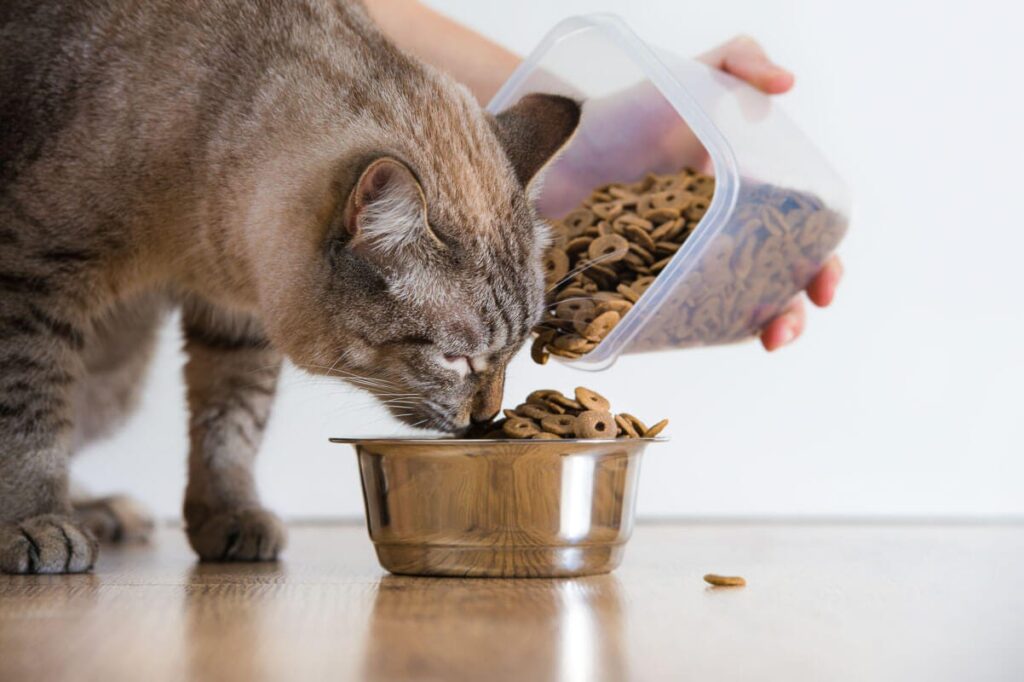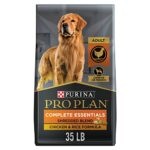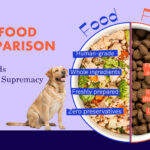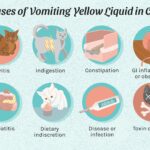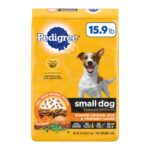A cat typically digests food within 12 to 24 hours. This timeframe can vary based on the individual cat and its diet.
How long does it take a cat to digest food? Cat owners must be concerned with their pet’s health and feeding schedule. From the moment a cat consumes its meal, the digestive process involves a complex system that breaks down food into nutrients and energy.
Proper digestion is essential for maintaining a cat’s overall well-being. Digestive efficiency affects how often a cat should be fed and can influence its behavior and energy levels. Recognizing the signs of healthy digestion helps owners detect any issues early on, ensuring the feline maintains a balanced and nutritious diet that promotes optimal health and digestion.
The Digestive System Of A Cat
Cats, those graceful and enigmatic creatures that saunter through our homes, possess a digestive system remarkable for both its efficiency and speed. Unlike humans, who take about 24 to 72 hours to digest a meal, cats usually complete the process within a brisk 12 to 24 hours. Let’s delve into the sophistication of a cat’s internal digestive machinery to better understand this quick turnaround.
Mouth And Teeth
The journey of digestion in cats begins in the mouth. Unlike humans, who grind their food, cats have a mouth adapted for tearing and cutting. Their teeth are sharp, and their jaws are powerful, designed to crunch through bones and flesh with ease. While they do have molars, these are not for grinding but for shearing meat from bones. This efficiency is vital, as it prepares the food for a smooth passage through the digestive tract.
- Incisors: small teeth at the front of the mouth, useful for nibbling and grooming.
- Canines: long and pointed, perfect for holding prey and tearing meat.
- Premolars and Molars: These sharp-edged teeth cut meat much like scissors cut paper.
Stomach And Digestive Enzymes
Upon swallowing, the food travels to the stomach, where the real magic happens. The stomach of a cat is a master at breaking down proteins, thanks to its highly acidic environment and potent digestive enzymes. Gastric juices mix with the ingested meat, effectively denaturing proteins and killing bacteria that may have tagged along.
| Enzyme | Function |
|---|---|
| Pepsin | Begins the breakdown of proteins into polypeptides. |
| Lipase | Assists in digesting fats. |
| HCl (Hydrochloric Acid) | Provides an acidic environment for enzymes to work and kills ingested bacteria. |
These enzymes work together to transform the food content into a semi-liquid mixture called chyme. From the stomach, chyme enters the small intestine, where nutrients get absorbed, and the journey of digestion proceeds. It’s important to note that while a cat’s stomach is immensely efficient at protein digestion, it is less equipped to handle a diet rich in carbohydrates, which can lead to digestive issues if not appropriately balanced.
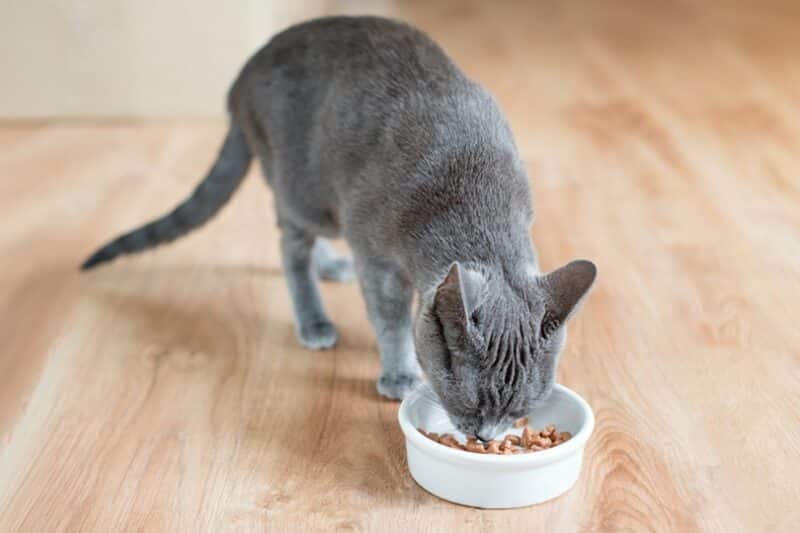
HOW LONG DOES IT TAKE A CAT TO DIGEST FOOD?
Caring for your feline friend involves understanding their nutritional needs and digestion. A key question many cat owners ask is: “How long does it take a cat to digest food?“ The digestive timeline in cats varies based on several factors. Knowing this timeline helps ensure your furry companion gets their meals at optimum times and aids in monitoring their overall health.
Digestion Process Timeline
Digestion in cats starts the moment they take their first bite and can take anywhere from 10 to 24 hours to fully complete the process. Once the food is ingested, it passes through the esophagus into the stomach, where acids and enzymes start breaking it down. This stomach process can last about 3 to 4 hours before the chyme (partly digested food) moves into the small intestine. The majority of nutrient absorption happens here over the next 8 to 12 hours. Finally, the indigestible parts pass into the large intestine and are eventually eliminated, concluding the digestion process.
Factors Affecting Digestion Speed
- Age: Kittens digest food faster than adult cats due to their accelerated metabolism.
- Diet: High-quality, easily digestible food will pass through the system more swiftly than lower-quality food.
- Activity Level: More active cats tend to have a faster digestive process.
- Health Status: Certain health conditions may slow down or accelerate digestion in cats.
Understanding these factors can help you better plan your cat’s meal schedule and recognize when their digestion rate deviates from what is typical, possibly indicating a health issue.
Importance Of Understanding Feline Digestion
As a devoted cat owner, it’s crucial to delve into the workings of your furry friend’s digestive system. Recognizing the intricacies of how cats process their meals can shed light on their dietary needs and health maintenance and prevent potential issues. This understanding becomes a compass for making informed choices about their diet, detecting early signs of discomfort or illness, and seeking timely veterinary intervention. Let’s explore the vital aspects of feline digestion, focusing on nutrient absorption and the health implications of poor digestion.
Nutrient Absorption
Digestion is more than just eating and eliminating; it’s a complex process where nutrients are extracted and harnessed to fuel a cat’s body. Once ingested, a cat’s food embarks on a remarkable journey through the digestive system. The journey typically spans 12 to 24 hours, a window in which proteins, fats, and carbohydrates are broken down and absorbed.
Nutrients such as amino acids from proteins, fatty acids from fats, and glucose from carbohydrates are assimilated into the bloodstream through the walls of the small intestine. This process is vital because these nutrients are building blocks for growth, repair, and energy. Equally important are the micronutrients—vitamins and minerals—absorbed in various digestion stages, each playing unique roles in maintaining bodily functions.
Health Implications Of Poor Digestion
When a cat’s digestive system falters, the repercussions can resonate throughout their entire body. Poor digestion can lead to malabsorption, where essential nutrients fail to enter the bloodstream, potentially causing nutritional deficiencies and compromising the immune response. Chronic digestive issues may manifest in symptoms such as weight loss, diarrhea, vomiting, or constipation, all signs that warrant immediate veterinary attention.
| Common Digestive Issues | Possible Indications | Actions to Consider |
|---|---|---|
| Food Intolerance | Upset stomach, itching, or ear infections | Discuss dietary changes with your vet |
| Inflammatory Bowel Disease (IBD) | Frequent vomiting or diarrhea; weight loss | Consult a vet for diagnosis and treatment |
| Parasitic Infections | Visible worms in stool, bloating, lethargy | Administer proper deworming medication |
Key takeaways:
- Recognition of dietary habits and stool consistency aids in monitoring digestive health.
- Regular check-ups provide early detection and treatment of digestive conditions.
- A quality diet and hydration are fundamental to optimal nutrient absorption.
Attuned observation and a proactive approach to your cat’s digestion can propel them toward a life of vitality and wellness. Be vigilant, consult professionals, and select a diet best suited for your cat’s unique digestive needs.
Tips For Monitoring Your Cat’s Digestion
Monitoring your cat’s digestion is paramount to ensuring their health and well-being. A proper digestive process is critical for your cat to absorb the nutrients needed to maintain energy levels and support bodily functions. By keeping a watchful eye on your cat’s eating and digestion, you can catch potential issues early on. Here are some practical tips that can help you stay on top of your cat’s digestive health.
Observing Eating Habits
Paying attention to your cat’s eating habits can provide significant insights into their digestive health. Regular meal patterns and consistent appetites are signs of a well-functioning digestive system. Consider these points:
- Monitor how much and how often your cat eats. Sudden changes could indicate a problem.
- Ensure they have access to fresh water to aid digestion and avoid dehydration.
- Keep a consistent feeding schedule to promote regular digestive cycles.
- Notice if your cat prefers certain types of food, which could reflect their digestive comfort.
Indications Of Digestive Issues
Identifying early signs of digestive distress can help prevent more serious health issues. Be vigilant for these symptoms:
| Symptom | Potential Digestive Issue |
|---|---|
| Changes in stool consistency | Diarrhea or constipation |
| Vomiting or regurgitation | Possibly food intolerance or blockage |
| Loss of appetite | Could indicate pain or discomfort |
| Frequent hairballs | May need better grooming or specialized diets |
| Abdominal discomfort or swelling | Warrants veterinary attention |
| Excessive flatulence | It may be dietary-related or a more complex health issue |
Consistent monitoring and awareness of these symptoms can lead to prompt veterinary care, improving the chances of a quick recovery and maintaining optimal health. If you observe any of these signs, it’s best to consult a vet for a precise diagnosis and appropriate treatment.
Frequently Asked Questions: How Long Does It Take A Cat To Digest Food?
How Long Does It Take A Cat’s Stomach To Empty?
Does wet cat food digest faster?
How Long Do Cats Stay Full After Eating?
What Is a Good Feeding Schedule for Cats?
What is a cat’s digestion duration?
Conclusion
Understanding your cat’s digestive timing can help you manage its meal schedule for optimal health. Generally, a feline’s digestion spans from 12 to 24 hours. By knowing this, you’re better equipped to notice any digestive issues early on. Observing your cat and seeking a vet’s advice with concerns keeps your furry friend healthy and happy.

